[Dec 2007, Volume 4 Quarterly Issue] Pdf File size - The IIPM Think ...
[Dec 2007, Volume 4 Quarterly Issue] Pdf File size - The IIPM Think ...
[Dec 2007, Volume 4 Quarterly Issue] Pdf File size - The IIPM Think ...
You also want an ePaper? Increase the reach of your titles
YUMPU automatically turns print PDFs into web optimized ePapers that Google loves.
MORE MARKETS, LESS GOVERNMENT<br />
Figure III: Pros And Cons For Opening India To International Trade In Education<br />
Cons<br />
Loss of public good character<br />
Only serves individual needs<br />
Rewards universitites independent<br />
of the broad public good<br />
Weakens public funding<br />
Eclipses the public sector by the<br />
private sector quality<br />
Pros<br />
Increased efficiency, quality and choice<br />
Consistent with human rights<br />
Breaks the monopoly of having low quality universities define what whould be learned<br />
Strengthens public funding because it would strengthen public confidence through increased<br />
accountability<br />
Strengthens the public sector due to competition<br />
sectors? <strong>The</strong>re are two paths in Indian<br />
higher education policy: to continue to<br />
protect it or to open it up to international<br />
competition with all of the impending<br />
implications. <strong>The</strong> answer will<br />
determine India’s future. So what<br />
should India do? One problem is that<br />
the arguments for and against opening<br />
India to higher education trade is generally<br />
made by two divergent groups of<br />
stakeholders. Macro-economists generally<br />
favor international competition;<br />
education policy officials generally do<br />
not. It might be useful to place each of<br />
their arguments on the table and analyze<br />
them one by one (Please do refer<br />
Figures- III and IV).<br />
Higher Education As A Public<br />
Good<br />
Those who oppose international trade<br />
in higher education will argue that<br />
higher education is a public good and<br />
that opening up India to international<br />
providers would threaten the maintenance<br />
of the public interest. Those who<br />
favor international trade will point out<br />
that overtly sectarian or philosophically<br />
dangerous providers can be controlled<br />
through the accreditation process.<br />
Further, they will argue that<br />
competition stimulates efficiency, wider<br />
choice, and higher quality (as it does<br />
in many sectors). In their view these<br />
characteristics are part of public interest.<br />
Is it in the public interest, they<br />
ask, to allow access only to low quality,<br />
inefficient and a narrow choice of professional<br />
programs?<br />
Figure IV: Pros And Cons (Contd.)<br />
Cons<br />
Leads to “Knowledge Capitalism”<br />
Trade Related Aspects of Intellectual<br />
Property Rights (TRIPS) would exclude<br />
low income scholars by maintaining<br />
high prices for curriculum<br />
materials<br />
Since knowledge is public good, reforms<br />
in education finance with decrease<br />
access to public good<br />
Threatens the “Social contract” in<br />
which the present generation finances<br />
future generations<br />
Trade jeopardizes human rights because<br />
it contradicts national commitments<br />
supporting free education<br />
Individual Vs. Social Needs<br />
Those who oppose say that international<br />
trade would serve only the needs<br />
of the individual and that service to the<br />
community, a natural part of higher<br />
education, would be lost if trade barriers<br />
were liberalized. Those who favor<br />
point out that at present human rights<br />
are being abrogated. All individuals<br />
have the right to education they might<br />
say, and if one individual wishes to<br />
study in a field provided by a foreign<br />
university, what right do we have as a<br />
Pros<br />
Leads of the strengthening of non-resourced<br />
subjects through cross-faculty<br />
resource transfer<br />
Adhering to TRIPS would increse access<br />
to high quality products by insuring incomes<br />
from their sale. Hence it would<br />
increase supply, the choice of products,<br />
and lower the real price<br />
Public goods are never free. Reforms in<br />
education finance will increase the income<br />
to public and private producers.<br />
Hence, it will increase the supply and access<br />
to a public good.<br />
Strengthens the social contract by increasing<br />
access, quality and equity<br />
(through cross-subsidization)<br />
Trade would increase human rights by<br />
allowing access to education where it is<br />
currently denied of unavailable<br />
THE INDIA ECONOMY REVIEW<br />
89


![[Dec 2007, Volume 4 Quarterly Issue] Pdf File size - The IIPM Think ...](https://img.yumpu.com/29766298/88/500x640/dec-2007-volume-4-quarterly-issue-pdf-file-size-the-iipm-think-.jpg)
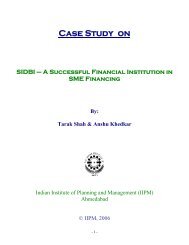
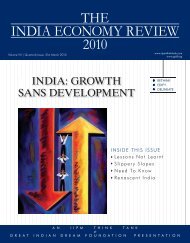
![[Feb 2008, Volume V Annual Issue] Pdf File size - The IIPM Think Tank](https://img.yumpu.com/43961117/1/190x245/feb-2008-volume-v-annual-issue-pdf-file-size-the-iipm-think-tank.jpg?quality=85)
![[June 2008, Volume V Quarterly Issue] Pdf File size - The IIPM Think ...](https://img.yumpu.com/41693247/1/190x245/june-2008-volume-v-quarterly-issue-pdf-file-size-the-iipm-think-.jpg?quality=85)
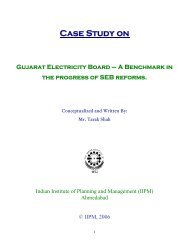
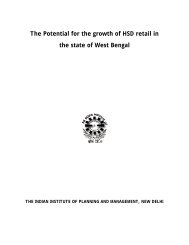
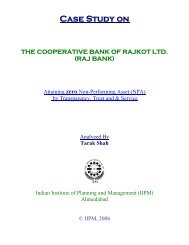
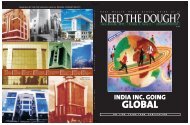
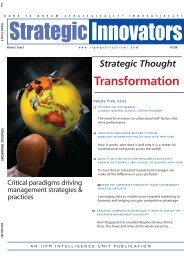
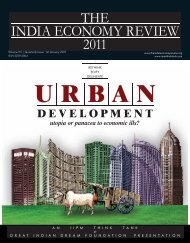
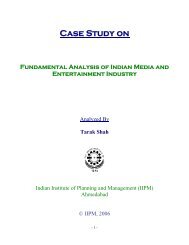
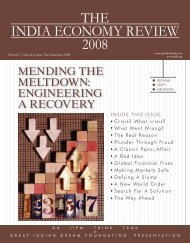
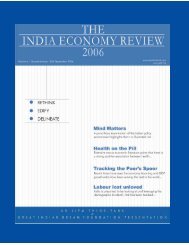
![[Volume VI | Quarterly Issue: 31st May 2009] Pdf File size](https://img.yumpu.com/27796051/1/190x245/volume-vi-quarterly-issue-31st-may-2009-pdf-file-size.jpg?quality=85)